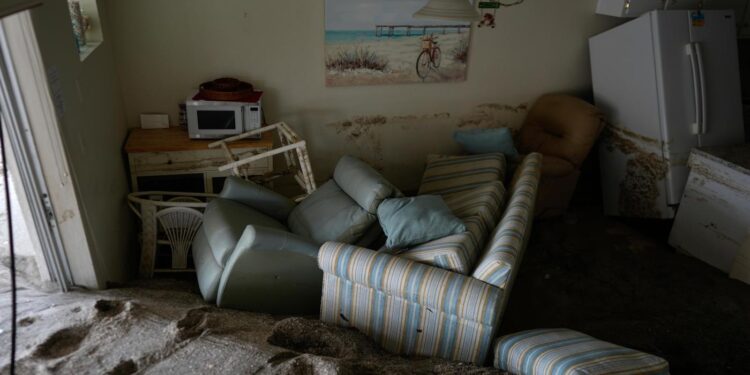
BRANDON, Fla. — Florida residents who fled hundreds of miles to escape Hurricane Milton made slow trips home on crowded highways, weary from their long journeys and the cleanup work awaiting them but also grateful to be coming back alive.
“I love my house, but I’m not dying in it,” Fred Neuman said Friday while walking his dog outside a rest stop off Interstate 75 north of Tampa.
Neuman and his wife live in Siesta Key, where Milton made landfall Wednesday night as a powerful, Category 3 hurricane. Heeding local evacuation orders ahead of the storm, they drove nearly 500 miles to Destin on the Florida Panhandle. Neighbors told the couple the hurricane destroyed their carport and inflicted other damage, but Neuman shrugged, saying their insurance should cover it.
Nearby, Lee and Pamela Essenburm made peanut butter and jelly sandwiches at a picnic table as cars pulling off the slow-moving interstate waited for parking spaces outside the crowded rest stop. Their home in Palmetto, on the south end of Tampa Bay, had a tree fall in the backyard. They evacuated fearing the damage would be more severe, worrying Milton might hit as a catastrophic Category 4 or 5 storm.
“I wasn’t going to take a chance on it,” Lee Essenbaum said. “It’s not worth it.”
Milton killed at least 10 people when it tore across central Florida, flooding barrier islands, ripping the roof off the Tampa Bay Rays ′ baseball stadium and spawning deadly tornadoes.
Officials say the toll could have been worse if not for the widespread evacuations. The still-fresh devastation wrought by Hurricane Helene just two weeks earlier probably helped compel many people to flee.
“Helene likely provided a stark reminder of how vulnerable certain areas are to storms, particularly coastal regions,” said Craig Fugate, who served as the Federal Emergency Management Agency’s administrator under President Barack Obama. “When people see firsthand what can happen, especially in neighboring areas, it can drive behavior change in future storms.”
In the seaside town of Punta Gorda, Mayor Lynne Matthews said rescuers only had to save three people from floodwaters after Milton passed, compared with 121 rescues from Helene’s flooding.
“So people listened to the evacuation order,” Matthews told a news conference Friday, noting that local authorities ensured residents heard them. “We had teams out with the megaphones going through all of our mobile home communities and other places to let people know that they needed to evacuate.”
As of Saturday morning, the number of Floridians still without power had dropped to less than 1.6 million, according to poweroutage.us. St. Petersburg’s 260,000 residents were told to boil water before drinking, cooking or brushing their teeth, until at least Monday.
Traffic crawled along stretches of I-75 as evacuees’ vehicles crowded alongside a steady stream of utility trucks heading south toward Tampa. While the densely populated city and surrounding Hillsborough County accounted for nearly one-fourth of the remaining power outages, Milton spared Tampa a direct hit, and the lethal storm surge that scientists feared never materialized.
On Sunday, President Joe Biden will survey the devastation inflicted on Florida’s Gulf Coast by the hurricane. He said he hopes to connect with Gov. Ron DeSantis during the visit.
The trip to Florida offers Biden another opportunity to press Republican Speaker Mike Johnson to call lawmakers back to Washington to approve further funding during their pre-election recess. It’s something the top House lawmaker says he won’t do.
Biden is making the case that Congress needs to act now to ensure the Small Business Administration and FEMA have the money they need to get through hurricane season, which stretches through the end of November in the Atlantic. The president said Friday that Hurricane Milton had caused $50 billion in estimated damages.
As the recovery continues, DeSantis has warned people to be cautious, citing ongoing safety threats including downed power lines and standing water that could hide dangerous objects.
“We’re now in the period where you have fatalities that are preventable,” DeSantis said Friday. “You have to make the proper decisions and know that there are hazards out there.”
National Weather Service Meteorologist Paul Close said rivers will “keep rising” for the next four or five days resulting in river flooding, mostly around Tampa Bay and northward. Those areas were hit by the most rain, which comes on top of a wet summer that included several earlier hurricanes.
“You can’t do much but wait,” Close said of the rivers cresting. “At least there is no rain in the forecast, no substantial rain. So we have a break here from all our wet weather.”
In coastal Pinellas County, the sheriff’s office used high-water vehicles to shuttle people back and forth to their homes in a flooded Palm Harbor neighborhood where waters continued to rise.
Madeleine Jiron, her husband and their dog, Harry Potter, climbed into the sheriff’s truck for a ride into their neighborhood. After evacuating to Tallahassee they were just arriving home.
“We don’t know what type of damage we have,” Jiron said. “We’ll see when we get there.”
Originally Published:







